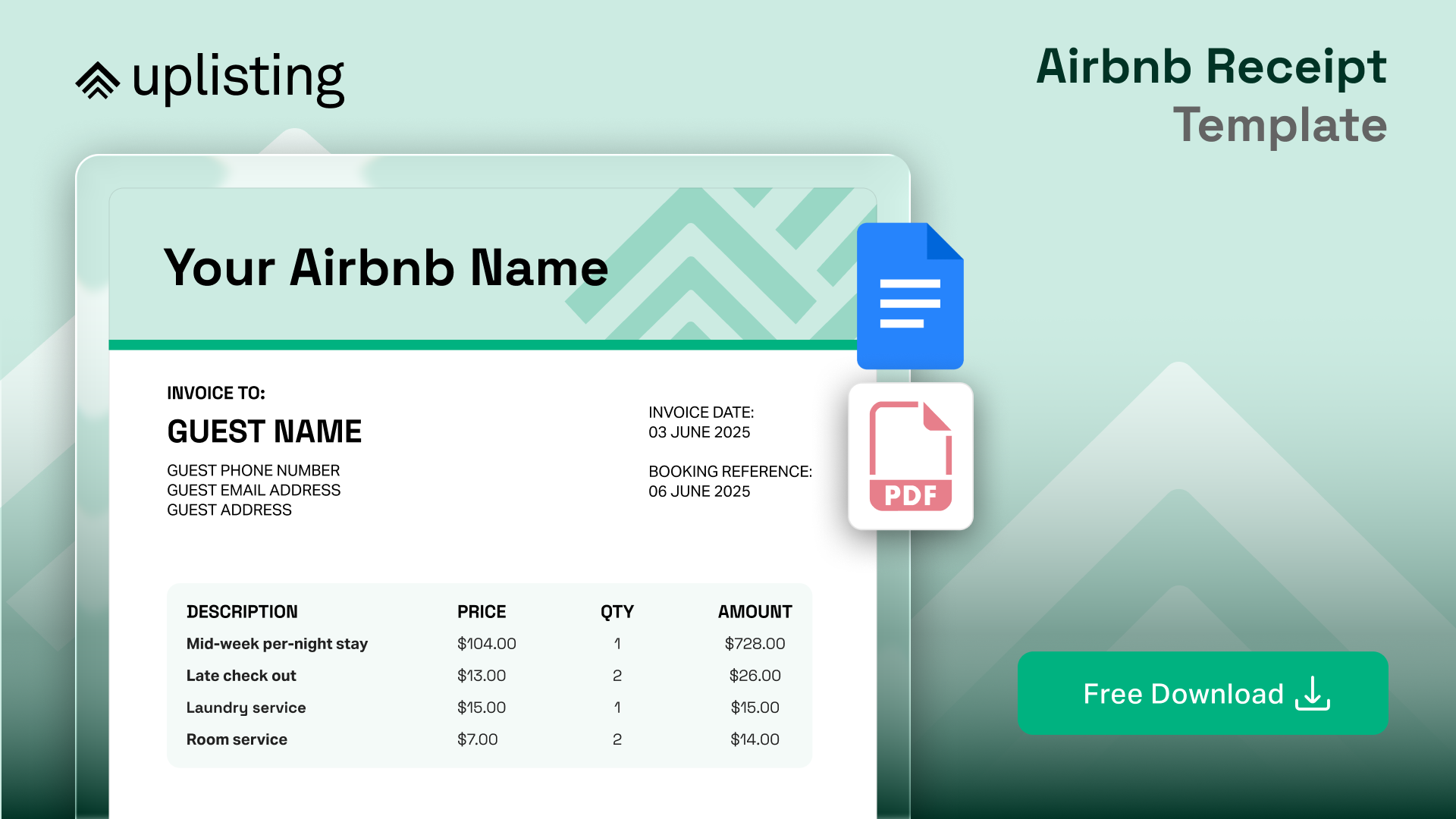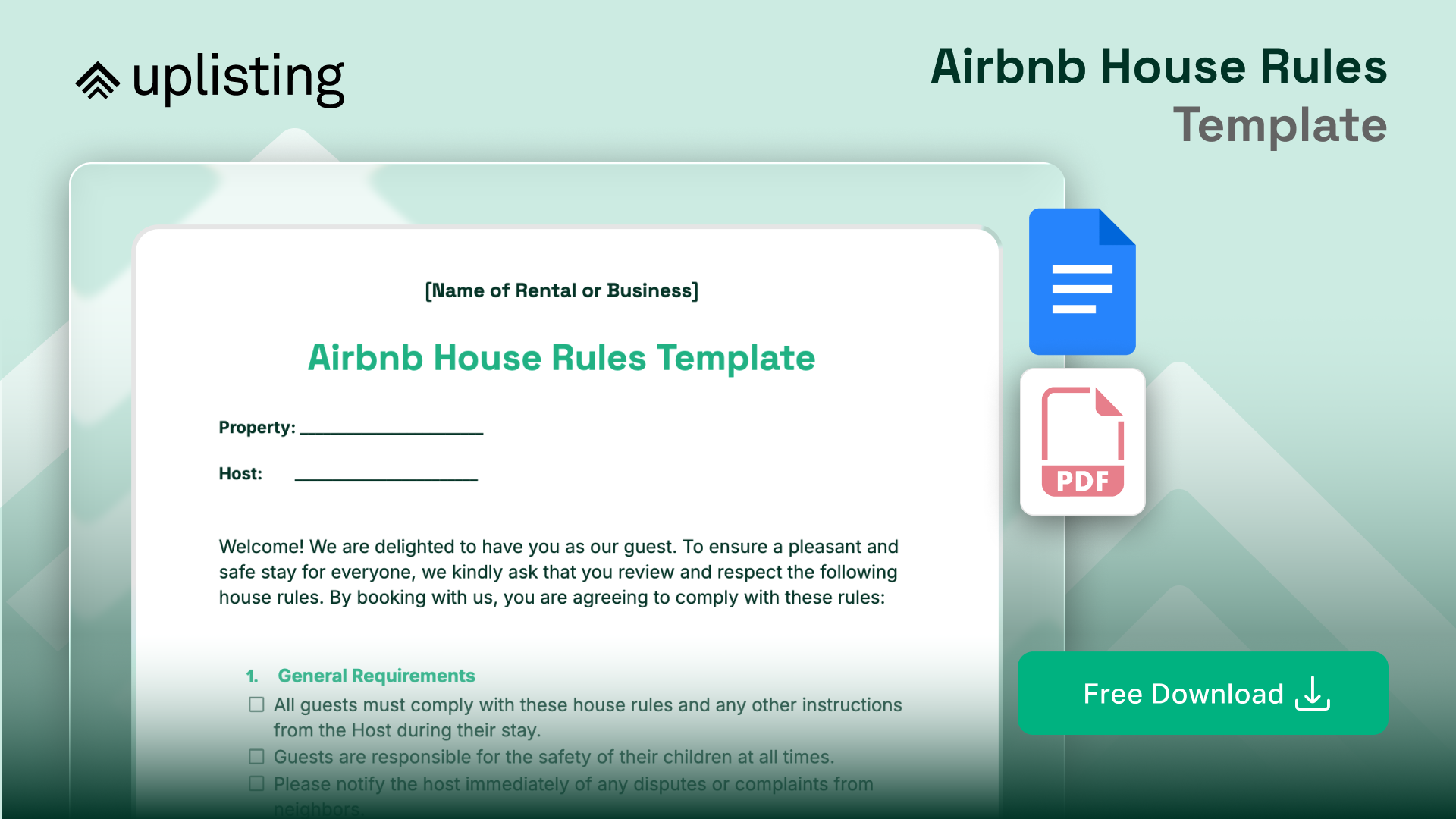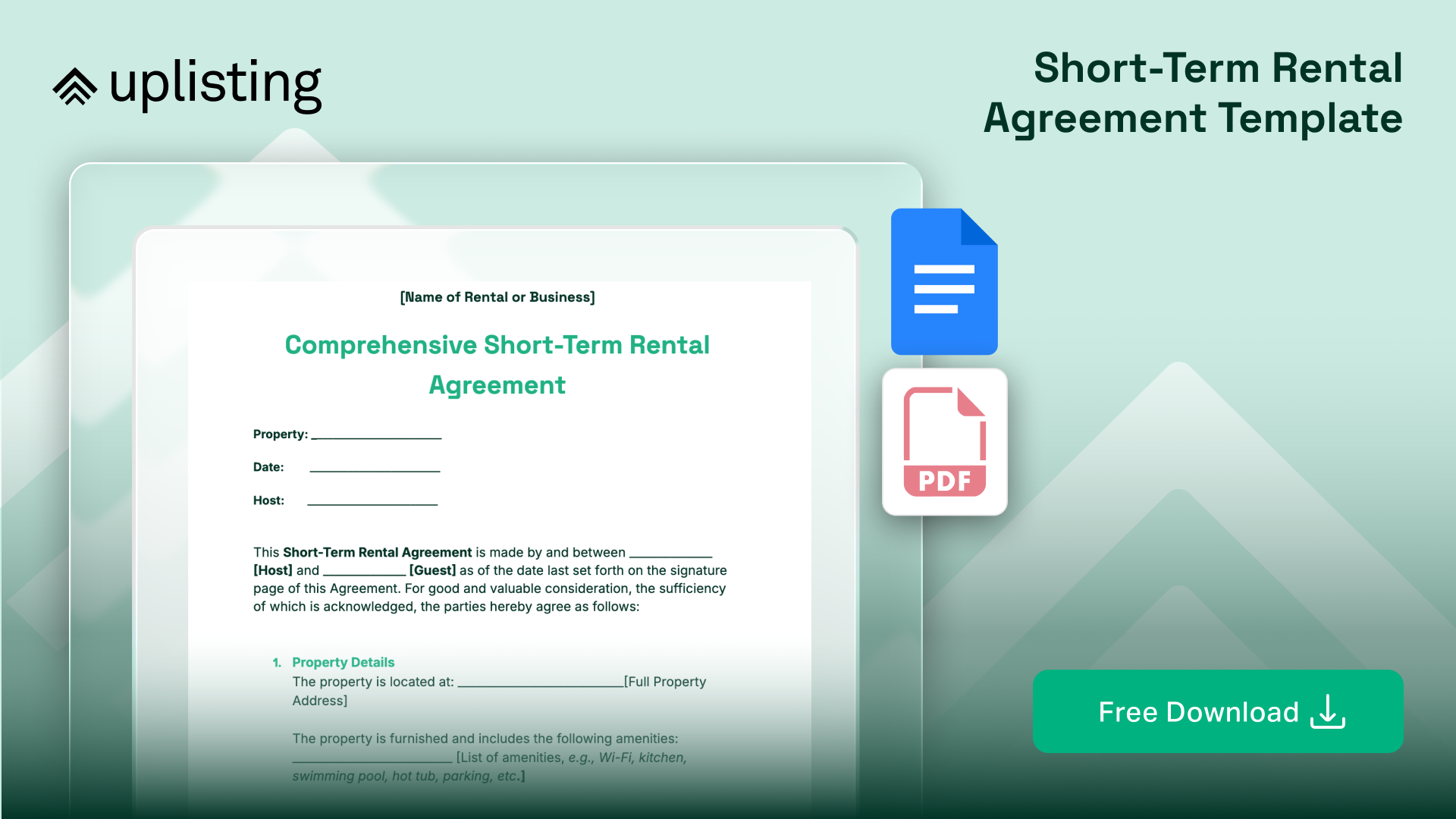Key Takeaways
The profitability of an Airbnb management business comes from efficient systems, not just adding more listings.
Strong relationships with property owners drive retention and referrals.
Diversifying revenue streams protects your business against market fluctuations.
It started with one spare room.
Today, more than 4 million hosts worldwide run Airbnbs, and many of them now manage multiple properties... not just their own, but for other owners too. What began as a side hustle has become a full-scale business model, with professional Airbnb managers building teams, systems, and serious revenue streams.
However, running a profitable short-term rental management business isn’t as simple as replying to guest messages and handing out keys. Scaling up means juggling owner expectations, guest satisfaction, property logistics, and the ever-changing rules of short-term rental platforms. Without the right foundation, it’s easy to get swamped by late-night calls, double bookings, or cash flow gaps that eat into your profits.
In this blog, we’ll break down the 7 key steps to grow a profitable Airbnb management business, from landing your first clients to streamlining operations and building a brand that scales.
If you're serious about growing a sustainable Airbnb property management business, these steps will help you do it right from the start.
Why Building an Airbnb Management Business Is Different
At first glance, Airbnb management looks like traditional property management with a few extra messages sprinkled in. In reality, it’s a very different beast.
Long-term rentals run on steady leases, predictable tenant needs, and a slower pace of operations. Short-term rentals, on the other hand, are high-frequency and high-pressure, and guest check-ins, turnovers, and support requests can happen daily.
Unlike standard property management, Airbnb managers act as both hosts and operators. That means balancing two sets of relationships: property owners who expect reliable returns, and guests who expect quick replies, spotless homes, and memorable stays. A single missed message or late cleaner can hit reviews, rankings, and ultimately profitability, leaving guests unhappy and property owners heading for the hills.
The difference also lies in visibility.
On Airbnb, host performance metrics like response rate, review scores, and booking acceptance directly affect how often your listings show up in search. Success depends on mastering hospitality, logistics, and marketing all at once, which makes this model uniquely challenging... but also uniquely rewarding.
So, what are our expert tips for balancing the unique pressures of an Airbnb management business? Let's get into them.
All-in-one Vacation Rental Software and Channel Management System
Get started in seconds by connecting Airbnb
Manage short-term rentals & bookings, message guests, take payment, and so much more. All in one easy-to-use platform (that never double-books).
Step 1: Define Your Services Clearly
Before taking on your first client or expanding your Airbnb management business, get specific about what you actually do (and what you don’t).
Saying you “handle everything” sounds flexible until you’re the one answering late-night calls about a broken hairdryer or running to the property to let in a contractor. Clear service boundaries protect your time and make your pricing easier to justify.
Start by choosing a structure: full-service or a la carte. Full-service means you handle the entire guest experience, including messaging, turnovers, maintenance coordination, pricing, and listing updates.
A la carte works better for owners who want to stay involved but need help with specific tasks like guest support or cleaner scheduling. You can tailor services to the type of owner you're working with, but don’t do it on the fly. Set those definitions from the start.
Define what’s in—and what’s not
Scope creep shows up when an owner asks for “a quick favor,” and suddenly you’re restocking shampoo or managing a bathroom remodel. Avoid the guessing game by writing down the exact services you offer and where your responsibility ends.
Here’s a clear breakdown:
Guest communication: Send booking confirmations, check-in info, and follow-up messages after checkout
Turnover coordination: Schedule cleanings, handle quality control, flag damage or missing items
Maintenance oversight: Organize repairs, get quotes, and coordinate vendor access (but don’t pay out-of-pocket)
Listing management: Update calendar availability, refresh headlines, adjust pricing, add new photos
Make sure your offer doesn’t leave room for interpretation. Coordinating a cleaner doesn’t mean buying cleaning supplies. Managing a repair doesn’t mean choosing a contractor without approval. Owners want clarity too—they just won’t always ask for it upfront.
Avoid handshake deals
Put everything in writing. Not just fees, but what you’ll actually do. Include how often you’ll update the owner, what counts as an emergency, and who approves repair costs. If you’re offering different levels of service across properties, document each one separately.
Clear service definitions save you from awkward conversations, unpaid extras, and confused owners. They also make your Airbnb management business easier to scale, because you’re not reinventing the process every time someone new calls.

Step 2: Build a Strong Owner Acquisition Process
Property management doesn’t scale without new listings, and new listings don’t appear without trust from property owners.
Growing an Airbnb management business means having a steady, repeatable way to find the right owners, connect with them quickly, and show exactly how you make their lives easier.
Where to find property owners
Start local. Owners often live nearby or visit regularly, especially when a property is a vacation home or part-time rental.
Here are a few reliable places to connect with owners:
Real estate investor groups: Many members have listings but don’t want to handle guests or turnovers.
Facebook groups and online forums: Local STR or property investment groups often include owners who need help but haven’t started looking for a manager yet.
Property tax records: Public records reveal who owns properties in your area—including out-of-state investors who want a hands-off setup.
Networking events: Real estate meetups and chamber of commerce mixers bring together people with properties and problems you can solve.
Every owner has different goals, but most share the same pain points: unreliable cleaners, inconsistent income, or too many guest issues. Ask about those before explaining your process. Listening first builds more trust than any pitch.
How to pitch your value effectively
Start with outcomes. Owners don’t care about software features or fancy workflows. They care about fewer complaints, better reviews, and consistent payouts. The more you tie your services to those results, the more confident they feel about hiring you.
Avoid industry jargon. Say you keep calendars full without double bookings. Say you make sure guests get answers fast so owners don’t have to. Say you handle turnovers so they never get a call from a guest about dirty sheets again.
Make the offer specific, with:
Clear pricing: Flat fee or percentages so there's no guessing.
Defined service list: Name exactly what’s included and what’s optional.
Owner access: Explain how often you’ll check in, what kind of reports they’ll get, and how they can track performance.
When every part of the offer is clear, owners stop worrying about the fine print and start focusing on how you’ll protect their investment.
Leveraging referrals from current clients
Referrals are the fastest way to grow. A happy owner who tells a friend about your service gives you pre-qualified leads you don’t have to chase, but most owners won’t think to refer you unless you ask.
The best time to ask is right after a win. Maybe a guest leaves a glowing review. Maybe revenue jumps after a rate adjustment. Maybe you solve a last-minute problem and save a booking. That’s the moment to ask, “Do you know anyone else who needs help managing a place like yours?”
Incentives help too. A cleaning credit, discounted invoice, or small referral bonus can nudge owners to share your name with their network.
Save yourself from your inbox
Automate with Uplisting
Automated guest messages keep your guest informed from booking through to check-out. They’re designed to answer questions before they arise, saving you time whilst keeping your guests happy.
Step 3: Streamline Operations with the Right Tools
Once your services are locked in and owners start coming on board, manual tasks start piling up fast. Checking multiple calendars, texting cleaners, answering guest questions at 11 p.m. gets chaotic quickly. If every action depends on you, growth stalls before revenue catches up.
Use property management software to centralize control
Property management software (PMS) gives you one place to manage bookings, calendars, guest messages, and tasks. No more juggling Airbnb tabs, spreadsheets, or group texts.
At a minimum, a starter-friendly PMS should:
Sync calendars across all booking platforms to prevent double bookings
Adjust pricing automatically based on occupancy or demand
Trigger tasks like cleaning or maintenance immediately after guest checkout
Track reservations, cancellations, and guest info in real time
Look for tools built for small portfolios. You need fast setup, mobile access, and automation that works without constant tweaking. Skip anything that handles everything but still leaves you buried in work.
Automate guest communication and turnovers
Fast, clear guest replies matter. People expect check-in details without asking, Wi-Fi codes before arrival, and support when something breaks.
Set up automated messages for every standard scenario, including booking confirmations, check-in instructions, welcome notes, checkout reminders, and review requests. When guests ask questions you’ve already answered, your messages do the work for you.
Turnovers need the same reliability. A PMS should automatically assign cleaning tasks after checkout, notify your team, and alert you when something’s missed. You shouldn’t have to guess if a unit is guest-ready or text someone for updates. If something’s late, you’ll know (and fix it) before the next guest walks in.
Keep owners updated with transparent reporting
Owners want clarity without chasing you for updates. When they can see how their property is performing, they stop asking questions that slow you down.
Send automated reports weekly or monthly. Include:
Booking revenue with platform breakdowns
Turnover and maintenance costs
Occupancy trends week over week or month over month
Recent guest reviews and average ratings
Make reports easy to read. Owners shouldn’t need a spreadsheet to figure out how their property’s doing. The more clearly you communicate, the more trust you build and the less hand-holding each client needs.
Step 4: Establish Reliable Vendor Partnerships
You can’t grow an Airbnb management business without people who consistently show up and follow through.
Cleaners, repair techs and photographers are the real ones keeping operations moving. When someone misses a shift, your reviews take the hit. And when you're working with someone else's investment, there's no room for excuses.
Finding dependable vendors
Start building your vendor list early. Ask experienced local hosts who they trust. Check neighborhood forums where short-term rental operators trade referrals and vet well.
Look for vendors who know how to work around tight turnarounds, stay in touch without constant reminders, and treat every property like it’s under inspection. Avoid anyone who needs to be chased for updates or forgets the lockbox code half the time.
Professional photographers are just as important. A well-shot listing attracts more clicks and supports higher nightly rates. Find someone who specializes in short-term rental photography, works with natural light, and turns around polished images quickly. If they’ve shot real estate or STRs before, even better, they already know which angles sell.
Standardize expectations from day one
Without clear direction, even reliable vendors can miss the mark. Set service agreements that define what you expect every time.
Create checklists for cleanings. Detail what “guest-ready” actually means, including photo requirements, restocked items, and timeframes. If a unit is left in bad shape, explain exactly when to contact you and when to handle it themselves.
Avoid last-minute confusion with clear policies:
Cleaning teams should follow a checklist, send photo proof, restock supplies, and report damage immediately.
Maintenance vendors need spending limits and approval rules for repairs above a set amount.
Photographers should know delivery deadlines, which rooms to prioritize, and how you want to use the images.
When everyone works from the same playbook, mistakes drop and quality stays consistent, no matter how many properties you manage.
Plan for when something breaks
Even the most reliable cleaner gets sick. A contractor might not answer the phone when you need them most. And a photographer might be booked for the next two weeks. Without a backup plan, you're cleaning floors and fixing door handles yourself.
Build a short list of backup vendors. Test their work before you need them. A second cleaning team, a trusted handyman, and a local cleaning service that can jump in when others can’t, that coverage keeps you from scrambling.
Emergencies don’t wait for business hours. When a guest reports a flooded bathroom or a last-minute booking pops up, you need someone who can step in without delay. Reliable partners make those moments manageable. Backup plans keep them from turning into disasters.
Create 5-star guest experiences
Give your guests unforgettable experiences
With Uplisting, you can send the right messages at the right time on all booking sites. Read and respond to guest messages in a single, unified inbox — whether you’re at the office or on the go.
Scale Your Airbnb Management Business Faster, With Uplisting
Growing a profitable Airbnb management business takes more than blood, sweat and tears.
It requires clearly defined services, efficient tools, strong owner relationships, and systems built to scale. When you streamline operations, automate guest messaging, and partner with reliable vendors, you gain back all that valuable time you can reinvest into growth and improving the guest experience.
From pricing strategy to financial tracking, success comes down to consistency and control. The more you simplify your workflows, the easier it becomes to deliver five-star experiences, earn owner trust, and grow your portfolio without burning out.
Ready to run a more efficient, profitable short-term rental business? Sign up for Uplisting to streamline your vacation rental management.
FAQs About Airbnb Management Business
Is Airbnb management profitable?
It can be if you run it right. Profit depends on how well you manage pricing, guest experience, and day-to-day operations. A few well-run listings with strong occupancy and low overhead often outperform larger, disorganized setups. As you streamline tasks like messaging, cleanings, and reporting, you create more breathing room—and more margin.
How much does it cost to hire an Airbnb management company?
Most property management companies charge between 10 and 30 percent of monthly revenue. Some go with a flat-rate model, especially for partial services. Full-service options usually cost more but remove nearly all owner involvement.
What matters is transparency; owners need to know what they’re paying for, and managers need to set clear expectations from the start.
Do I need a real estate license to manage Airbnb properties?
That depends on where you operate.
Some cities and states require a real estate license for short-term rental managers, especially if you collect payments or negotiate terms on behalf of owners. Others treat short-term rentals as a separate category. Before you take on a property, check local laws to avoid fines or unwanted attention from regulators.
Can you hire someone to manage your Airbnb?
Yes. Property owners often bring in a co-host, short-term rental manager, or local team to handle guest communication, turnovers, pricing, and emergencies. The key is finding someone reliable and who can respond quickly, fix problems without delay, and keep properties guest-ready between every stay.


















.png)

